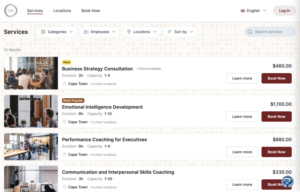Are you passionate about helping others find the right career path? If so, you can turn that passion into a career by becoming a career coach!
By guiding students and graduates toward their career goals, you can help them achieve success and fulfillment.
As a career coach, you’ll need to have a good understanding of the required certifications and skills for different career paths. However, with the right training, becoming a successful career coach is within your reach.
So, why wait? Let us guide you through the process of becoming a career coach and help you achieve your professional goals.
Table of Contents
ToggleWho is a Career Coach?
A career coach is a trained professional who helps people navigate their career paths. They offer guidance and support to help their clients make career-related decisions, set and achieve career goals, and overcome any obstacles they may face in their professional lives.
Career coaches provide practical advice to assist their clients in reaching their full potential, finding job satisfaction, and advancing in their chosen careers. They may offer services such as resume writing, interview preparation, skill assessments, job search strategies, networking guidance, and career transition support. These professionals often have expertise in areas such as human resources, counseling, psychology, or specific industries.
Essentially, a career coach is like your professional friend, who will help you decide which field to enter by counseling and discussing the prospect of the field you are wondering about.
What Does a Career Coach Do?
You already know the straightforward answer to this question! Yet, there’s a but…
In general, a career coach provides personalized guidance and support to empower clients to make informed decisions, overcome challenges, and achieve their career objectives. However, the duty of a coach doesn’t end here. There’s more to it than meets the eye:
- Meeting and setting up goals: A career coach meets their client and learns about their current career situation and prospects. They then understand the client’s short and long-term plans.
- Assessment of skills: Next up, a coach tries to learn about the skills the client has honed. After successfully understanding it, they try to match them with career options aligning with their preferences.
- Suggestions of improvement: The goal of a career coach is not only to help determine a career option but also to suggest ways to improve. It can be some skills that the client needs to brush up on or learn something new to excel at the career they want to opt for.
- Preparing documents: Being a novice, the client may not be able to make proper resumes, cover letters, or prepare application documents as per industry rules. A career coach also helps with crafting these necessary documents.
- Mock Interviews: Another important task that a career coach conducts is mock interviews. Before facing real-time situations, you need to practice it, and as a professional friend, the coach guides you.
- Personality development: A career coach helps with your flaws and lets you gain more clarity in your communication skills. They also help in boosting confidence and making you ready for the corporate world.
What Skills Should A Career Coach Have?
We talked a lot about how a career coach helps in improving the skills of their client, but let’s take a look at what skills a person needs to have when they want to become a career coach!
1. Communication skills
A coach should always be well-versed and able to communicate with the student clients effectively. So, it is essential to have good communication skills to help you communicate and guide your client. You must showcase positivity and hopefulness to deal with people from diverse backgrounds. There might also be experienced clients, so you need to have expertise in communication to cater to their needs.
2. Empathy
Empathy is a very crucial skill that you need to have if you are planning to become a career coach. If you can’t empathize with your client’s concerns and understand their fear or relate to their problems, you can’t align them to the perfect career goal they want to choose. Empathy helps you in building a good rapport with the clients and builds trust. Once your student client trusts you, it becomes easier to handle their problems and decide upon career options.
3. Training skills
To become a successful coach, you must have the proper skills to train people. You should be able to make a plan of action, encourage your students, set objectives, and much more. You need to act like a teacher to them and assist them in boosting their confidence, to have hope and faith in their hard work, and bringing productive change to them.
4. Strong industry knowledge
Unless you have a deep knowledge of the industry, you can’t become an effective career coach. You have to know the technological changes taking place, how the market is adapting to new regulations, what is trending and why it is so, and whatever shifts or changes are taking place. Being a coach, you should be aware of everything so that you can guide your client effectively.
5. Interpersonal skills
To be a career coach is easy if you have strong interpersonal skills, like:
- Listening Skills
- Questioning Skills
- Problem-Solving Skills
A great coach listens first and then speaks – it is essential to listen to your clients attentively and understand what they want, how they want to achieve their goals, and what support they need from you.
After you listen correctly, you need to question them to comprehend whether your understanding and their thoughts align. You will be building someone’s career, so you must be very particular in understanding everything.
Once everything is set, you need to guide your client, and that’s when you require problem-solving skills. This is the primary reason why your client has come to you, and you need to address their problem and solve it so that their mental barriers are broken, and they can have proper confidence.
How To Become A Career Coach?

Image by vectorjuice on Freepik
Now comes the most important part of becoming a career coach – how can you be one? Well, there are some conditions that you need to fulfill or the steps you need to cross to become one.
Gain a career coach certification or degree
You can come from any field of education and become a career coach, but you need an additional career coaching certification. Wondering why? Well, that makes you more acceptable to your clients and also helps you develop more focused skills and required knowledge to train students.
By becoming a certified career coach, you learn how to assist clients in making their resumes or searching for jobs. You can do it online or offline, whichever way is convenient for you, as several institutions are offering the certification.
Additionally, getting a career coaching certification provides you with a professional network of fellow coaches and industry experts. They can give you helpful tips, share resources, and let you know when opportunities come up. Plus, you can keep learning and getting support from them as you grow in your career.
Furthermore, certified career coaching programs often offer specialized training in niche areas such as executive coaching, career transition coaching, or industry-specific coaching. This means you can focus on developing skills that cater to the specific needs of different client demographics and career paths. It’s a fantastic way to become an expert and stand out in the field.
Certified career coach programs often include practical activities like case studies, role-playing exercises, and real-world client interactions. These hands-on experiences help reinforce theoretical knowledge and build confidence and proficiency in applying coaching techniques effectively.
Choose a niche
If you come from a humanities background, you need to learn more about the IT field to train clients who wish to enter this world. Gaining expertise depends on which field you are coming from and which group of audience you want to guide. If you have a background in English, it becomes easier for you to coach an individual on excelling in their communication skills. It would help if you gained expertise in the particular niche you want to coach – it can be communication, law, IT, digital marketing, or aviation – whichever suits your interests the most.
Moreover, when selecting a niche, consider not only your background but also your passion and interests. Choosing a niche that aligns with your expertise and enthusiasm allows you to provide more authentic and impactful coaching to your clients.
Picking a niche can help you stand out from the competition in the coaching market and attract clients who are looking for specific expertise. You can choose to focus on industries like healthcare, finance, or technology, or on career stages like executive leadership or entrepreneurship. When you find your niche, you can establish yourself as an authority in your chosen area of expertise. After that, you can choose coaching platforms that best align with your niche and reach your target audience effectively.
Choosing a niche can really help you level up your knowledge and stay on top of what’s happening in your industry. Focusing on one area lets you become an expert, which can make you more trustworthy as a coach. Plus, you’ll be able to give advice that’s relevant and up-to-date to your clients, which is always a good thing.
Choosing a niche can really help you level up your knowledge and stay on top of what’s happening in your industry. Focusing on one area lets you become an expert, which can make you more trustworthy as a coach. For example, if you specialize in career coaching for students or recent graduates, having an understanding of the financial implications of education choices can be a major asset. Using a student loan calculator to help clients estimate their loan payments and develop a plan to manage their debt can be a valuable service that sets you apart from other coaches. Plus, you’ll be able to give advice that’s relevant and up-to-date to your clients, which is always a good thing.
Build a network
You have to establish proper connections in the professional world to help your clients get connected to organizations or people who are influential. You can do this by attending conferences, scheduling one-on-one meetings with industry professionals, and initiating conversations with other career coaches. Once you have a strong network, it also helps you get a strong clientele.
Building a network isn’t just about expanding your client base; it’s also about fostering collaborative relationships and staying updated on industry trends and opportunities. Engaging with fellow professionals, industry leaders, and subject matter experts not only provides valuable insights but also opens doors to potential partnerships, referrals, and mentorship opportunities.
Using digital platforms like LinkedIn and professional networks can really boost your networking game. By joining online groups, sharing cool stuff, and talking with industry leaders, you can get noticed in your field and beyond.
You could share your knowledge, resources, and connections with your network to add value. For instance, you could write some useful blog posts or host webinars with valuable insights. You could also offer free coaching sessions to help aspiring professionals or introduce clients to people who could be helpful to them. By adding value to your network, you can build stronger relationships and goodwill.
Streamline Your Coaching Business with Trafft: The Ultimate Appointment Management Solution
Ready to take your coaching practice to the next level? Say goodbye to scheduling headaches and administrative hassles with Trafft!
Here’s why you should consider using Trafft to manage your appointments, calendar, clients, and payments all in one place:
- Effortless Appointment Scheduling: Say goodbye to back-and-forth emails and phone calls. With Trafft, clients can easily book appointments online, 24/7, based on your real-time availability.
- Seamless Calendar Integration: Keep your schedule organized and never miss a coaching session. Trafft syncs seamlessly with your calendar, ensuring that you’re always up-to-date and never double-booked.
- Client Management Made Easy: From initial consultation to follow-up sessions, Trafft helps you stay on top of your client interactions. Access client profiles, appointment history, and notes all in one centralized platform.
- Secure Payment Processing: Simplify your billing process and get paid faster with Trafft’s secure payment processing feature. Accept payments online, track invoices, and manage your finances with ease.
Ready to streamline your coaching practice and focus on growing your coaching business?
Sign up for Trafft today and take the first step towards a more efficient and profitable coaching business!
Build your online presence
Having an online presence can significantly boost your credibility and visibility as you’re trying to become a career coach.
Building an online presence isn’t just about having a static website or social media profiles; it’s about actively engaging with your audience and providing valuable content and insights. Consider regularly updating your website with blog posts, articles, or case studies that demonstrate your expertise and offer practical advice to your audience.
Moreover, harness the power of social media marketing tools to connect with potential clients and industry professionals. Share relevant content, engage in conversations, and participate in industry-related groups and discussions to establish yourself as a thought leader and expand your network.
Don’t forget how important it is to have a visual brand and tell stories when building your online presence. You gotta spend some cash on professional branding items like logos, graphics, and photos that represent your coaching style and values. Use storytelling to share your journey, show off client success stories, and prove the impact of your coaching services. This will help you create a kick-ass online presence that will attract potential clients.
You can make your online presence more interesting by adding videos, webinars, or podcasts to your content. These interactive formats can help you connect with different audiences, gain more credibility, and address their specific needs and concerns. By incorporating multimedia content in your online strategy, you can make your clients’ experiences more engaging and meaningful.
One way to enhance your online strategy is by using the best QR code generator to create interactive experiences for your clients.
Study the market
It would help if you did a thorough market study of the employment trends so that you can offer up-to-date information. You should thoroughly monitor the market trends every month to clearly know what companies are looking for and coach your students accordingly.
Doing a deep dive into the market analysis can help you spot new opportunities, challenges specific to your industry, and changing skill requirements. Stay in the loop on the latest technology developments, regulatory changes, and consumer preferences that may have an impact on the job market and your career path.
Also, make use of data-driven insights and analytics tools to keep an eye on how well your coaching is doing. Keep a tab on important performance indicators (KPIs) such as job placement rates, how happy your clients are with your service, and their career progression outcomes. By doing this, you can figure out the areas that need improvement. Then, you can tweak your coaching strategies to better cater to your clients’ needs.
Stay up-to-date with the latest developments and best practices in career coaching. Join industry associations, professional networks, and online forums to stay connected. You can exchange ideas, share resources, and collaborate with fellow professionals in your field by participating in discussions, webinars, and workshops. This will help you improve your knowledge and skills and keep you on top of the game in your career.
Conclusion
As you become a career coach and start your coaching business, many responsibilities fall on you.
You need to work hard, meet commitments, and learn continuously to develop professionally and make your client’s dream career come true. You need to understand your client well so that you can help them in achieving their goals.
As you slowly develop the skills yourself and follow the steps, you can become an effective career coach and make a positive impact.
Bon voyage!
Hungry for more?
We have just what you need! Dive into additional resources about coaching and gain more knowledge:
- How to Start a Coaching Business: A Step-By-Step Guide
- The Best Coaching Questions You Could Ask Your Clients
- Guide to Coaching Business Models with Examples
- How to Create an Efficient Coaching Schedule
- The Best Coaching Apps to Take Your Business to The Next Level
- Coaching Scheduling Software: Top 7 Picks & In-Depth Reviews



